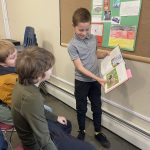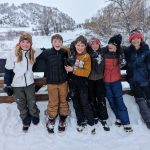Bringing the World into the Classroom
Mountain Connection: September 19th, 2023
By: Jed Donnel
Much is made about the usefulness of ‘immersion’ when learning a second language, and Kevin’s Spanish 5 class exemplifies the absolute best aspects of such an approach. Full disclosure: I am a far cry from being fluent in Spanish, and I understood no more than about 8% of what was said during my brief visit. But, as a language teacher, I certainly understood what the students were doing, and that the fruits of their efforts were overt. From the angle of linguistics – that is, in consideration of language as a medium, and regardless of the subject matter being addressed – they demonstrated fluency in multiple modes of speech, writing, and thought. In fact, the fluency level among the students was off the chart, as they were able to transition between different modes as would a group of intellectuals during a high-brow conversation within their native language.
Kevin began class with small talk, which included the normal pleasantries of welcomes, and was met with varied and nuanced responses from the students, who spoke in conversational, exact, and personalized terms. Subject matter involved where to find the best sushi in Steamboat (with mixed opinions), what students would be doing during the coming weekend, and what colleges they expect to visit during the application season. Each new subject blended seamlessly from the previous, and all of it included room for highly subjective answers, lots of questions from the students to each other, and all in civil and engaging tones. They really listened to each other and didn’t compete for time on stage or correctness of answer. It was quite pleasant for me, even though I understood but a small fraction of what they were saying. One student even let Kevin know (in Spanish) that he needed to see the nurse, was politely excused and therefore missed the opening minutes of the discourse, then quietly returned to class having seen the nurse, had a seat, listened carefully, and found his way into the discussion without any interruption. It was as though he were making the rounds at a social gathering, had wandered into the middle of a conversation and then fell fluidly into its contents. Clearly, therefore, all of the students are thinking in Spanish, rather than needing the time to translate their ideas in and out of English. The course is fast-paced, highly engaging, and everything that the students discuss further strengthens their command of the language.
Equally impressive (if not more) was the subject matter that dominated the majority of the class period and accounted for a deeply intellectual consideration of identity. Following a brief vocabulary quiz in which students applied terms they had previously studied to a variety of applications (and during which I chuckled as they asked clarifying questions that Kevin assumed were already answered by the directions – the subtle distinction between being ‘ready’ and being ‘prepared,’ for example – but that he nonetheless fielded in specific terms per student such that their completion of the quiz was actually an extension of an ongoing discussion, all in Spanish) Kevin introduced the film they would be viewing: Una Mujer Fantastica. Here, the tone shifted in acknowledgment that complexity, itself, was much closer to the surface. And, in accordance, students adjusted their own perspectives to consider and respond to questions posed in intellectual terms.
How do we think about and react to the fact that societies are composed of individuals with different identities (tastes, appearance, etc.)? How do societies change (or not) their language to account for such expression? What happens in a society when a person does not identify with one side of the binary, for instance, in terms of gender? He wrote the term ‘Transgeneridad’ on the board and discussed the traditional method in Spanish of assigning gendered articles to nouns, which we tend to think of as being distinctly different: el vs la, for instance. Language, however, also changes over time, and in this case the current discussions on whether and how such articles may or should change within Spanish-speaking cultures is vast, varied, and highly complicated. The terms ‘la’ and ‘el’ are becoming more fluid, as is happening in the U.S. within non-gendered or transgendered associations, and current variations in Spanish include (though are not limited to) ‘los chicos’ opting to ‘les chices’ and ‘lxs chicxs,’ as just a few of several such examples.
The film, directed by Sebastian Lelio and starring Daniela Vega, won the Oscar for Best Foreign Language Film in 2018. It centers on a transgender woman in Chili who navigates various interactions with other characters in realistic and complex circumstances. Before beginning the film, Kevin instructed the students to collect moments in the film that resonate with them, to note the central character’s specific experiences as an individual, and to assess other characters who either do or do not respect her identity. Given the subject matter (and remembering that all of the conversation was happening in Spanish), I admired how the entire class considered such context in a high-minded, objective regard. The discourse remained personable as Kevin fielded the students’ difficult, engaging questions, and he guided their reactions to cycle back to the central idea that language is fluid. To assist their considerations, they needed to first hold on to their personal opinions (without discouraging them) and consider how and why language may shift to account for identity. One term doesn’t need to suit all, which is the point, and since language is not static, the terms that do not suit individuals can be modified to become more accommodating while still being understandable for others in their use.
Following the screening, the students will each write an opinion piece stemming from the film and regarding modes of identity. They will have lots of room within the assignment to take on such subject matter from a personal angle, or apply a creative mode that best suits them individually. They’ll reference the film and specific moments within it to assist their conclusions. Next month, they’ll also venture to Yampatika to help translate their library into Spanish. For my own perspective, I am elated that a group of kids who are so adept within a second language – and so considerate of nuance in how they speak, write, and think – will apply their vast knowledge to benefit others.
Want to learn more about our upper school experience?



